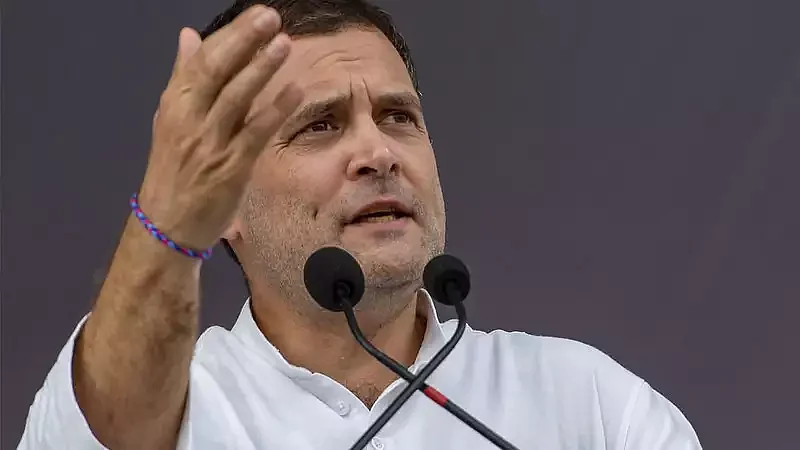‘Want to empower Manipur by guaranteeing horticulture MSP, not help corporates eyeing palm oil plantation’
Congress leader Rahul Gandhi questioned Centre’s decision to aggressively push palm oil production in various parts of India including the North-East at an election rally in Imphal on Monday

Congress leader Rahul Gandhi has questioned the Centre’s decision to aggressively push palm oil production in various parts of India including the North-East.
Speaking at an election rally in Imphal, the capital of pollbound Manipur on Monday, Rahul Gandhi said, “I want to ask, who exactly are the palm oil plantation going to help? Are they going to help people of Manipur or companies like Patanjali or those two-three large businesses who were to be benefited from demonetisation, failed GST and farm laws?”
Gandhi was referring to the August 2021 decision of the Union Cabinet to clear the Rs 11,040-crore National Mission on Edible Oils-Oil Palm (NMEO-OP) with a goal to expand palm oil plantations in the North-east and Andaman and Nicobar Islands and raise the production by three times to 11 lakh Metric Tonnes by 2025-26.
The decision was called a “game-changer” in making India atmanirbhar (self-reliant) in edible oil production by the Prime Minister Narendra Modi but flagged as ecologically dangerous by environmentalists and opposition leaders.
Congress leader and former Union Environment Minister Jairam Ramesh said on Twitter, “Oil Palm plantation had been studied in 1980s and rejected since it’s a recipe for ecological disaster — as seen in SE Asia, and now to be unleashed in Northeast & Andaman.”
The harmful impacts of oil palm on environment and social mores are well-documented. There is already a longstanding legal battle between the government and environmentalists against its plantations.
The Supreme Court stopped commercial plantations of oil palm on Little Andaman’s forest land in 2002. In 2019, the Andaman administration approached SC seeking a relaxation on the ban.
The apex court then asked the Indian Council of Forestry Research & Education (ICFRE), an autonomous institute under the Environment Ministry, for its opinion, which went on to raise multiple red flags in its January 2020 report.
ICFRE submitted that introduction of oil palm “should be avoided” in biodiversity rich areas, including grasslands, without detailed studies on its ecological impact.
However, Cabinet clearance was given despite those concerns and without any detailed study available in public domain, as per media reports.
Environmental experts believe that the government’s move has its merits but express doubts over its implementation given the current government’s track record on environmental issues and its natural inclination towards corporate ‘friends’.
“Oil palm production is important for India. It is cost effective as the production output per unit of land is 4-10 times higher compared to other crops like soy, sunflower and mustard. But there is a genuine apprehension that corporates may lobby for changes in land ceiling laws that would enable them to go for industrial-scale plantations rather than sourcing their raw material from (mostly small) farmers,” Siraj Hussain, Visiting Senior Fellow at ICRIER, who has served as Union Agriculture Secretary, told National Herald.
Hussain explained that there are several other challenges. Processing units would have to be built side by side along with palm oil plantation because its Fresh Fruit Bunches (FFBs) are highly perishable and must reach processing units within 24 hours.
Farmers would have to be patient for the first few years when there will be no income. In Andhra Pradesh, farmers uprooted their own palm oil plantations because there was no income.
“But even after all the efforts, India might continue to import palm oil because it comes cheaper from other nations. Complete ‘atmanirbharta’ need not be a desirable goal for every agricultural commodity. It would be more cost effective if we continue to import palm oil and invest our resources in producing higher-value agricultural and horticultural crops and tap export markets,” said Hussain.
While Rahul Gandhi did not get into the details of the palm oil issue in his speech, he did mention Congress party’s commitment to guarantee Minimum Support Price (MSP) in horticulture produces.
“We want to protect the future of Manipur, we want to make Manipur self-sufficient in rice production, we want to expand irrigation facilities so that farmers are able to grow 2-3 crops per year,” he said.
Gandhi also hit out at Modi government’s consistently favouring a few rich corporates. “The difference in our vision and their vision is that they want to help 1-2 businesses by transforming Manipur into palm oil plantation and we want to empower Manipur by transforming horticulture and giving MSP. We are not interested in helping Baba Ramdev,” he said.
Meanwhile, two big corporates – Adani Wilmar, which already owns India’s number one edible oil brand ‘Fortune’ and Godrej Agrovet Ltd –are already eyeing major expansion in oil palm following the Centre’s new policy announcement.
In August 2021, Adani Wilmar filed a draft red herring prospectus (DRHP) with market regulator SEBI for a big-bang IPO. The same has been stayed for now by SEBI pending certain investigations.
Despite the fact that aggressive palm oil plantation has the potential to cause large scale and long-term adverse impact on the environment and community life, the issue has been largely missing from public debate.
It remains to be seen whether Rahul Gandhi can make it a talking point for Manipur voters this election season.
Follow us on: Facebook, Twitter, Google News, Instagram
Join our official telegram channel (@nationalherald) and stay updated with the latest headlines
